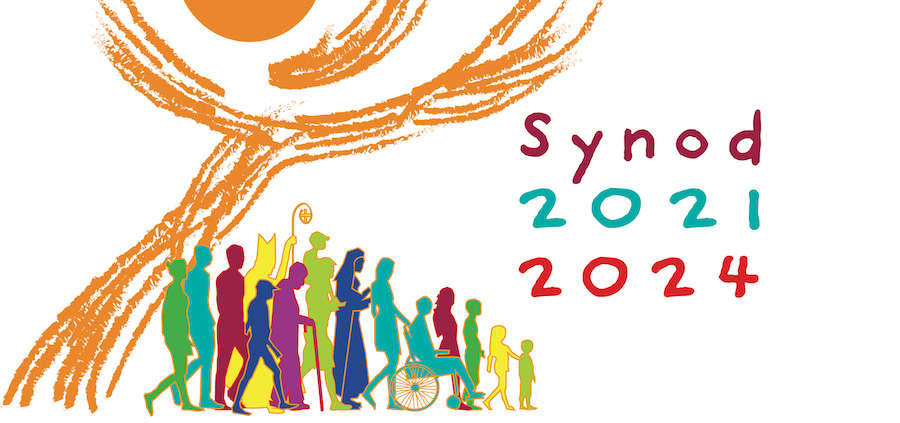Reluctant Missionaries: Synod Report for October 19, 2023
The “harmony of the Synod hall” stands in stark contrast to the “terrible silence” of the world’s indifference to migrants and refugees, Cardinal Michael Czerny, SJ, said at a press briefing this morning.
The cardinal’s remarks came as Synod delegates are preparing to join Pope Francis in a prayer service for migrants and refugees that will take place in St. Peter’s Square later today. The service will be an “opportunity to prayerfully enact what we have been talking about” in the Synod, Cardinal Czerny said.
Joining the cardinal to share their experiences of ministering to migrants were Bishop Daniel Flores of the Diocese of Brownsville, Texas; Archbishop Anton Dabula Mpako of the Diocese of Pretoria, South Africa; and Maronite Fr. Khalil Alwan of Lebanon.
Bishop Flores was a leader of the synodal process in the U.S. and has been appointed one of the president-delegates at the Synod. He acknowledged that meeting the needs of migrants in his diocese on the U.S.–Mexico border has been “a challenging experience.” A multifaith coalition of local residents has come together to develop “on-the-ground ways to receive and assist” migrants, he said.
The bishop related this effort to the current theme of the Synodal Assembly, that of participation. Participation “is something I have lived in my diocese,” he said, describing it as “the deepest sense of the inculturation of the faith.”
“The church is bigger than national borders,” he added.
Fr. Alwan is the secretary-general of the Council of Catholic Patriarchs in the Middle East. He said that Lebanon has absorbed 2 million Syrian refugees since 2011, a situation that has placed great strain on the country. Many refugees live in inhumane conditions in camps.
Lebanon “is the country that welcomes the highest amount of refugees in the world,” he said. Because the international community is not offering more assistance for refugee resettlement, the Lebanese state “is forced to become a political asylum country” and fund the hosting of refugees with public money. This has increased poverty among Lebanese citizens, Fr. Alwan explained.
The Lebanese people “hold doubts about the intentions of the Europeans” who do not aid in resettlement efforts. He called on Europe to offer assistance and “promote human dignity” among Syrian refugees.
Archbishop Dabula Mpako said that poverty is the most important cause of migration for South Africa’s 2.9 million migrants. He described these migrants as “economic refugees.”
The Diocese of Praetoria has a “well-established ministry for pastoral care” of migrants that focuses on their basic needs of food, clothing, accommodation, assistance with documentation, health care, and education, the archbishop said.
“It has not been easy,” he clarified, admitting that at times “we have felt inundated.” He shared how the diocese expected to welcome 10 new migrants each day when the program first began, only to have 250 or more arrive.
Archbishop Dabula Mpako said that “some of the migrants are Catholic who want to continue practicing their Catholic faith,” and so the diocese offers space for services in their native languages.
His description had echoes of a comment from Bishop Pablo Virgilio S. David of the Diocese of Kalookan in the Philippines at a press briefing yesterday. Bishop David spoke of the “diaspora” of Filipino immigrants throughout the world as “reluctant missionaries” who “try to live their faith wherever they find themselves.”
Representatives at the briefing today also commented on their ongoing experience of the Synod.
For Fr. Alwan, “This Synod is truly different in terms of method and content” from previous Synods that he has attended. “It gives us grounds for hope for a church that may have a happy future,” he said.
Archbishop Dabula Mpako emphasized that “many African countries have fertile ground for synodality.” He cited the history of the Small Christian Community (SCC) movement in Africa as a forerunner to the synodal method.
“We are building upon an experience we have already had,” he said.
Asked about the relationship between synodality and the church hierarchy, Archbishop Dabula Mpako said that the Synod is trying to discover “how the two can work in such a way that synodality can infuse the hierarchical structure.”
Cardinal Czerny expanded on this by saying that “identification between orders and offices is being overcome.” He pointed to Dr. Paolo Ruffini, a layperson who is head of the Dicastery of Communications, as one example of this separation between ordination and office.
“There is no danger to the nature of the church,” he said.
The 344 Synod delegates present this morning continued their conversations on section B.3 of the Instrumentum Laboris in small groups. Each group is focusing on one of the five major sub-questions of section B.3. In addition, three working groups of theologians and canonists will produce reports to augment the discussions. ♦
Michael Centore
Editor, Today’s American Catholic




Leave a Reply
Want to join the discussion?Feel free to contribute!